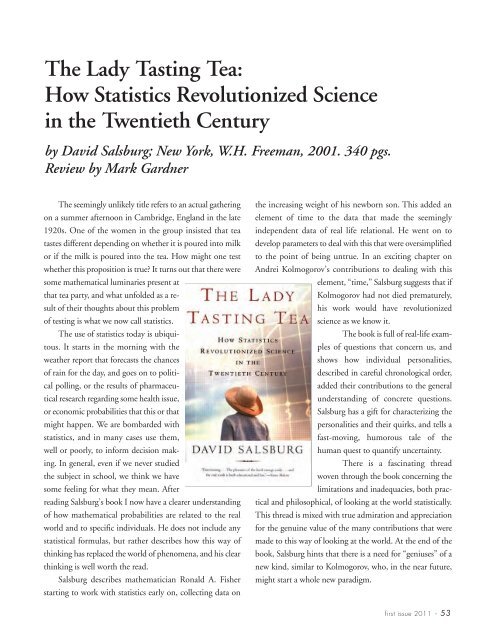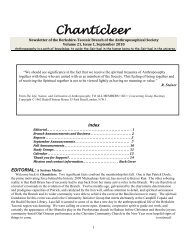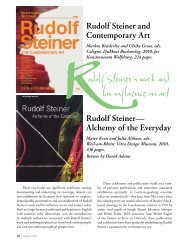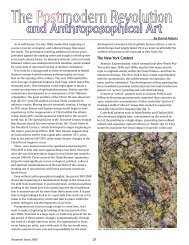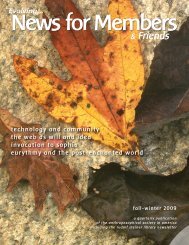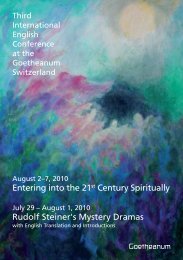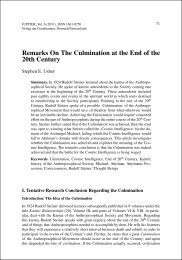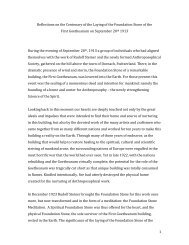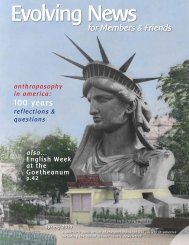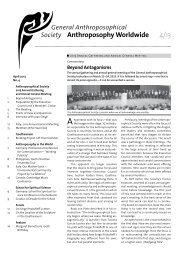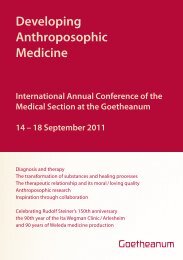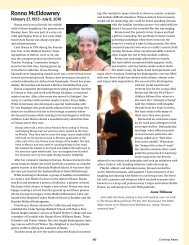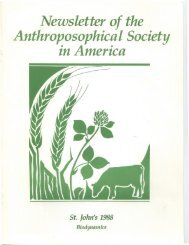Rudolf Steiner's Vision for the Future - Anthroposophical Society in ...
Rudolf Steiner's Vision for the Future - Anthroposophical Society in ...
Rudolf Steiner's Vision for the Future - Anthroposophical Society in ...
Create successful ePaper yourself
Turn your PDF publications into a flip-book with our unique Google optimized e-Paper software.
The Lady Tast<strong>in</strong>g Tea:<br />
How Statistics Revolutionized Science<br />
<strong>in</strong> <strong>the</strong> Twentieth Century<br />
by David Salsburg; New York, W.H. Freeman, 2001. 340 pgs.<br />
Review by Mark Gardner<br />
The seem<strong>in</strong>gly unlikely title refers to an actual ga<strong>the</strong>r<strong>in</strong>g<br />
on a summer afternoon <strong>in</strong> Cambridge, England <strong>in</strong> <strong>the</strong> late<br />
1920s. One of <strong>the</strong> women <strong>in</strong> <strong>the</strong> group <strong>in</strong>sisted that tea<br />
tastes different depend<strong>in</strong>g on whe<strong>the</strong>r it is poured <strong>in</strong>to milk<br />
or if <strong>the</strong> milk is poured <strong>in</strong>to <strong>the</strong> tea. How might one test<br />
whe<strong>the</strong>r this proposition is true? It turns out that <strong>the</strong>re were<br />
some ma<strong>the</strong>matical lum<strong>in</strong>aries present at<br />
that tea party, and what unfolded as a result<br />
of <strong>the</strong>ir thoughts about this problem<br />
of test<strong>in</strong>g is what we now call statistics.<br />
The use of statistics today is ubiquitous.<br />
It starts <strong>in</strong> <strong>the</strong> morn<strong>in</strong>g with <strong>the</strong><br />
wea<strong>the</strong>r report that <strong>for</strong>ecasts <strong>the</strong> chances<br />
of ra<strong>in</strong> <strong>for</strong> <strong>the</strong> day, and goes on to political<br />
poll<strong>in</strong>g, or <strong>the</strong> results of pharmaceutical<br />
research regard<strong>in</strong>g some health issue,<br />
or economic probabilities that this or that<br />
might happen. We are bombarded with<br />
statistics, and <strong>in</strong> many cases use <strong>the</strong>m,<br />
well or poorly, to <strong>in</strong><strong>for</strong>m decision mak<strong>in</strong>g.<br />
In general, even if we never studied<br />
<strong>the</strong> subject <strong>in</strong> school, we th<strong>in</strong>k we have<br />
some feel<strong>in</strong>g <strong>for</strong> what <strong>the</strong>y mean. After<br />
read<strong>in</strong>g Salsburg’s book I now have a clearer understand<strong>in</strong>g<br />
of how ma<strong>the</strong>matical probabilities are related to <strong>the</strong> real<br />
world and to specific <strong>in</strong>dividuals. He does not <strong>in</strong>clude any<br />
statistical <strong>for</strong>mulas, but ra<strong>the</strong>r describes how this way of<br />
th<strong>in</strong>k<strong>in</strong>g has replaced <strong>the</strong> world of phenomena, and his clear<br />
th<strong>in</strong>k<strong>in</strong>g is well worth <strong>the</strong> read.<br />
Salsburg describes ma<strong>the</strong>matician Ronald A. Fisher<br />
start<strong>in</strong>g to work with statistics early on, collect<strong>in</strong>g data on<br />
<strong>the</strong> <strong>in</strong>creas<strong>in</strong>g weight of his newborn son. This added an<br />
element of time to <strong>the</strong> data that made <strong>the</strong> seem<strong>in</strong>gly<br />
<strong>in</strong>dependent data of real life relational. He went on to<br />
develop parameters to deal with this that were oversimplified<br />
to <strong>the</strong> po<strong>in</strong>t of be<strong>in</strong>g untrue. In an excit<strong>in</strong>g chapter on<br />
Andrei Kolmogorov’s contributions to deal<strong>in</strong>g with this<br />
element, “time,” Salsburg suggests that if<br />
Kolmogorov had not died prematurely,<br />
his work would have revolutionized<br />
science as we know it.<br />
The book is full of real-life examples<br />
of questions that concern us, and<br />
shows how <strong>in</strong>dividual personalities,<br />
described <strong>in</strong> careful chronological order,<br />
added <strong>the</strong>ir contributions to <strong>the</strong> general<br />
understand<strong>in</strong>g of concrete questions.<br />
Salsburg has a gift <strong>for</strong> characteriz<strong>in</strong>g <strong>the</strong><br />
personalities and <strong>the</strong>ir quirks, and tells a<br />
fast-mov<strong>in</strong>g, humorous tale of <strong>the</strong><br />
human quest to quantify uncerta<strong>in</strong>ty.<br />
There is a fasc<strong>in</strong>at<strong>in</strong>g thread<br />
woven through <strong>the</strong> book concern<strong>in</strong>g <strong>the</strong><br />
limitations and <strong>in</strong>adequacies, both practical<br />
and philosophical, of look<strong>in</strong>g at <strong>the</strong> world statistically.<br />
This thread is mixed with true admiration and appreciation<br />
<strong>for</strong> <strong>the</strong> genu<strong>in</strong>e value of <strong>the</strong> many contributions that were<br />
made to this way of look<strong>in</strong>g at <strong>the</strong> world. At <strong>the</strong> end of <strong>the</strong><br />
book, Salsburg h<strong>in</strong>ts that <strong>the</strong>re is a need <strong>for</strong> “geniuses” of a<br />
new k<strong>in</strong>d, similar to Kolmogorov, who, <strong>in</strong> <strong>the</strong> near future,<br />
might start a whole new paradigm.<br />
first issue 2011 • 53


